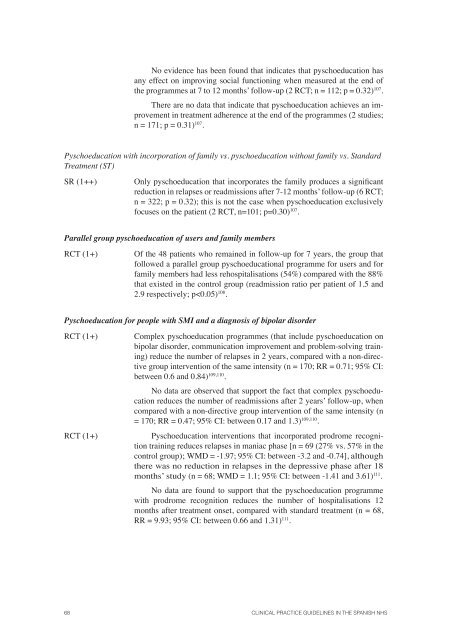CPG for Psychosocial Interventions in Severe Mental ... - GuÃaSalud
CPG for Psychosocial Interventions in Severe Mental ... - GuÃaSalud
CPG for Psychosocial Interventions in Severe Mental ... - GuÃaSalud
You also want an ePaper? Increase the reach of your titles
YUMPU automatically turns print PDFs into web optimized ePapers that Google loves.
No evidence has been found that <strong>in</strong>dicates that pyschoeducation has<br />
any effect on improv<strong>in</strong>g social function<strong>in</strong>g when measured at the end of<br />
the programmes at 7 to 12 months’ follow-up (2 RCT; n = 112; p = 0.32) 107 .<br />
There are no data that <strong>in</strong>dicate that pyschoeducation achieves an improvement<br />
<strong>in</strong> treatment adherence at the end of the programmes (2 studies;<br />
n = 171; p = 0.31) 107 .<br />
Pyschoeducation with <strong>in</strong>corporation of family vs. pyschoeducation without family vs. Standard<br />
Treatment (ST)<br />
SR (1++)<br />
Only pyschoeducation that <strong>in</strong>corporates the family produces a significant<br />
reduction <strong>in</strong> relapses or readmissions after 7-12 months’ follow-up (6 RCT;<br />
n = 322; p = 0.32); this is not the case when pyschoeducation exclusively<br />
focuses on the patient (2 RCT, n=101; p=0.30) 107 .<br />
Parallel group pyschoeducation of users and family members<br />
RCT (1+)<br />
Of the 48 patients who rema<strong>in</strong>ed <strong>in</strong> follow-up <strong>for</strong> 7 years, the group that<br />
followed a parallel group pyschoeducational programme <strong>for</strong> users and <strong>for</strong><br />
family members had less rehospitalisations (54%) compared with the 88%<br />
that existed <strong>in</strong> the control group (readmission ratio per patient of 1.5 and<br />
2.9 respectively; p

















